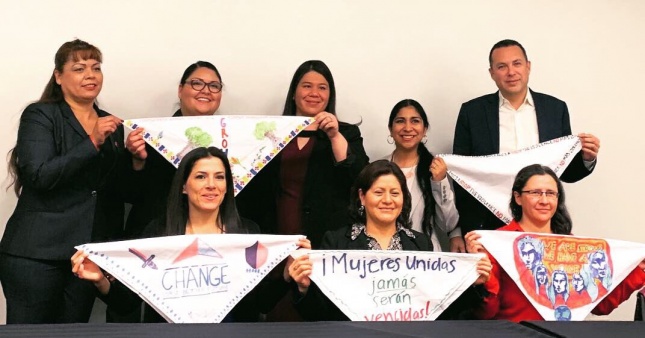Written by Olivia Garcia, Public Policy and Training Manager, Esperanza United
On March 27, 2019, Justice for Migrant Women and other co-sponsors, including Esperanza United (formerly Esperanza United: National Latin@ Network), hosted Out of the Shadows: Exposing Workplace Sexual Violence Against Farmworker Women and Other Low-paid Women Workers Congressional Briefing. Farmworkers and other low-wage workers, like janitorial staff and domestic care workers, face rampant sexual violence with no options for resource or justice. This briefing brought public attention to their experiences and ways the everyone can help protect all workers.
Mónica Ramirez, Founder and President of Justice for Migrant Women opened the event and introduced Congressman Joseph Kennedy. Congressman Joe Kennedy (D-MA) asked the group to reflect on the legacy of Cesar Chavez, as the U.S. federal commemorative holiday in honor of him occurs on the 31st of March each year. Kennedy also highlighted that all workers should be able to fight for and obtain fair wages and be able to perform their jobs with dignity and respect from employers and colleagues. The fact that there were so many members, approximately 60 people representing the public, Congressional staffers, students, and advocates present for this event was indicative of the fact that low-wage workers and their safety from sexual violence in the workplace is a topic of concern for many.
The event continued with a testimonial from Maria Gonzalez, United Farm Worker Leader and Dairy Activist, which was incredibly moving. Maria’s story highlighted her various experiences with sexual harassment, wage theft and illegal retaliation from the dairy industry. Maria was fired for not accepting the sexual advances of the factory owner’s brother-in-law. The brother-in-law also threatened her and her family for many years after she left the industry. Maria was able to sue the company, which helped her move on with her life. She now calls for individuals to be mindful when they purchase food and food products and to make sure that they are buying from equitable companies that provide workers with safety.
After the testimonial, a panel of advocates spoke about the similarities in the ways that low-wage female workers experience exploitation, sexual harassment and assault, retaliation, injury, abuse and other injustices in the work place. Jessica Stender, Senior Counsel, Workplace Justice & Public Policy, at Equal Rights Advocates moderated the panel.
Hector Sánchez, Executive Director of Labor Council for Latin American Advancement emphasized the fact that Latinas/os are some of the most vulnerable workers in the United States. He stated that for our economic system to allow for wage deficiency and for the abuse of workers is an international embarrassment.
Originally from Oaxaca, Mexico and a native speaker of Mixtec, Librada Paz, from Rural and Migrant Ministry and Recipient of the Robert F. Kennedy Human Rights Award told the audience that she waited for 15 years before speaking of the harassment and injustices she experienced in the workplace. Paz also mentioned that most low-wage workers do not know their rights and do not report crimes or injustices in the workplace because they fear deportation, retaliation, or not being believed by police, coworkers or their supervisors.
Antonia Peña, of the National Domestic Workers Alliance, stressed the humiliation felt by domestic workers, arguing that they are often made to feel un-valued because of their profession. She stated, “It is real work to take care of kids and the elderly and to keep an organized home, and we are treated like sub-human because we work inside the home.” Peña spoke about the Domestic Workers Bill of Rights which have been passed in New York, Hawaii and California and will hopefully be introduced at the federal level by Senator Kamala Harris (D-CA) and Representative Pramila Jayapal (D-WA).
Hector Sánchez wrapped up the panel by taking an audience question about the role of men in stopping workplace gender-based violence. Sánchez mentioned that allyship is important but certainly not enough. Men should take responsibility and understand their role in creating inclusive spaces and employment systems. “We must also return to ensuring dignity for all workers,” he stated. He then emphasized how labor unions are necessary to protect workers and that there is an attack on unions. Paz joined in the discussion and emphasized the importance of collective bargaining, which serves to protect all workers.
Moderator Jessica Stender wrapped up the panel by adding more context on the legal protections not afforded to low-wage workers. “Worker discrimination laws does not provide enough remedies because protections to workers are based on industry, and low-wage workers have very little protection under Title VII of the Civil Rights Act of 1964,” she said. Industry standards for low-wage workers are very low.
To bring awareness to farmworkers and the sexual violence experienced by them as they harvest our food, Justice for Migrant Women developed The Bandana Project. This project asks individuals to decorate bandanas with art and/or messages that bring awareness to injustices and sexual violence and send them to the Justice for Migrant Women headquarters in Fremont, Ohio.
It was an insightful panel with many inspiring moments. The meeting ended with a discussion about how we are all humans beings. “Somos seres humanos,” Antonia Peña said, ending the discussion on a positive note. Our fight continues, and Esperanza United was honored to be a part of this event.
